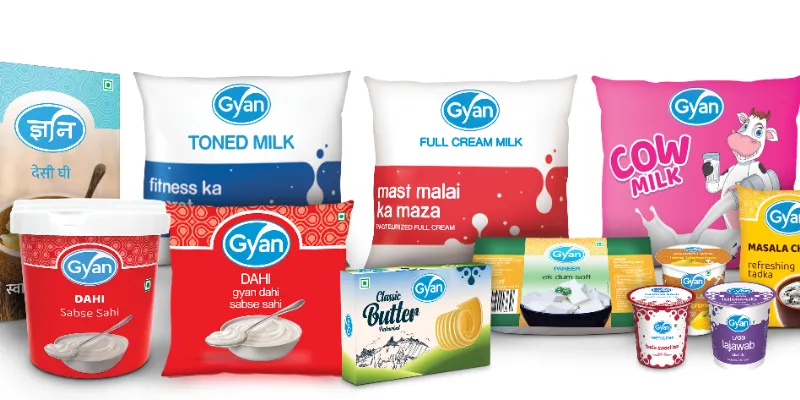These UP-based tobacco business owners stepped out of their comfort zone to build a Rs 908 crore dairy products business
After dabbling in tobacco and real estate businesses, brother-entrepreneur-duo Jai and Anuj Agarwal launched Gyan Dairy in 2007. The Lucknow-based company, offering 27 dairy products, has carved a niche for itself in the Uttar Pradesh market.
Jai Agarwal was running a family tobacco business in Lucknow when in 2005, his brother Anuj Agarwal decided to join him. However, with no possible avenues for disruption in the tobacco business, the brothers decided to explore newer opportunities.
“We were living in a semi-rural area. A tobacco business doesn’t need too much hard work or infrastructure. Additionally, there was no professional or social growth there. We were these entitled kids living comfortably. When my brother realised there wasn’t much for him to contribute, we started brainstorming for new ideas,” Jai Agarwal tells SMBStory.
For a few years, the brothers dabbled in real estate but nothing materialised. But an old real estate investment changed gears for them.
The brother-duo decided to renovate and reset a shutdown dairy unit bought a few years ago and launched in 2007. The Lucknow-headquartered company started manufacturing dairy products, including milk, curd, chaach (buttermilk), paneer (cottage cheese), and butter, among others.
At present, it manufactures and sells 27 dairy products across Uttar Pradesh. The Lucknow-based company recently onboarded actor Manoj Bajpai to promote the brand’s launch in Kanpur. The brand also operates exclusive retail outlets called Gyan Fresh Stores, spread across 53 locations in the northern state.
Last year, the dairy brand clocked a turnover of Rs 908 crore.
Disrupting the dairy industry with technology
Initially, one of the biggest challenges for the brand was the lack of a proper dairy ecosystem in the eastern and central Uttar Pradesh, Jai claims. This was both good and bad for the brand as the entrepreneur-duo had to put in extra effort to get the operations and the supply chain in order. However, the good part was that they were able to dig up an untapped reservoir of opportunities.
According to a report by IMARC Group, the Indian dairy industry was valued at Rs 10,527 billion in 2019.
“We faced a lot of challenges in sourcing raw materials and convincing the farmers. These farmers have been cheated on so many times that they are not ready to trust companies easily who come to them,” Jai says. He claims that it took the brothers three years to convince them.
Jai and Anuj Agarwal always had dreamt of giving back to their district (Farrukhabad). Jai shares, “There is a lot of capital and infrastructure cost involved in the dairy industry, but we took on the challenge. Gyan Dairy started interacting directly with the farmers. They set up several milk collections that have milk testing units.
“The Milk Chilling Centres (MCC) are places where the farmer comes with his milk and gets it tested for its fat and protein content. It's an automatic machine, wherein the farmer’s milk is weighed and a receipt giving feedback is auto-generated,” he explains.
Today, Gyan Dairy has collaborated with 3,000 villages and supports 1.2 lakh farmers across India for raw materials.

Good quality is the key
The dairy industry is already dominated by giants, including Amul and Mother Dairy. Supplying good quality dairy products is the only way to survive and thrive in this industry, Jai claims.
“The biggest evolution that I have seen over the years is the dairy industry going from low quality, low rates of dairy products to high-quality products. Initially, the consumer was price-sensitive,” he says.
For this, he claims, Amul has played an important role in transforming the country’s dairy industry and bringing in fair practices to play.
To date, Gyan Dairy has taken several steps to ensure good quality of dairy reaches its consumers.
“Milk has to be processed in the right manner. Further, it has to be chilled within four hours of milking. We also keep a strict check against adulteration. All the utensils and machines used in our factory are clean, and follow some very stringent standard operating procedures (SOPs),” Jai says.
The brand pays utmost priority to its customers’ health. He says, “If you don’t do this and cut corners, then you will be compromising on the basic microbiological count of milk.”
Apart from this, Jai also elucidates three factors that have contributed to manufacturing good quality milk. First, improving the breed of cattle. “A better breed gives you a better quality of products and a better yield for money.”
Second, giving the right kind of feed to the cattle. “The feed that you give to the animal comes out in the form of milk. So, if you're giving hygienic feed to the animal, it stays healthy and gives healthy and tasty quality milk.”
Finally, the third aspect is amalgamating everything with technology. Jai says technology has been a blessing for the dairy industry as now the middlemen have been almost eliminated. He says dairy farmers can now apply for loans, get the right price for their milk, all thanks to technology.
Customising with consumer-driven perspective
As he indulges more into the technological aspect, Jai says Gyan Dairy has launched a mobile application — the Gyan Fresh mobile app — which delivers milk at the doorstep of customers between 6 am and 8 am, and works on a subscription-based model.
“The idea was to power our brand and also to compete with strong cooperatives like Mother Dairy and Amul. These brands have been there for a long time, and just by providing better quality milk and packaging might not be sufficient to win the trust of the consumer,” Jai explains.
The Gyan Fresh app was in trial stages when the COVID-19 pandemic broke out, which spurred into a mainstream business for the dairy brand.
While the pandemic was a “problematic” event, the Gyan Dairy team dug up resources, manpower, and infused investment in internal operations to set up the application, which is now available in a few parts of Lucknow.
It was successful in creating some positive buzz over the past few months. At present, it has over 24,000 active registered users, and over 9,000 deliveries are carried out every day.
Gyan Dairy’s business was down by 25-30 percent during the initial lockdown, but thanks to the mobile app, it has now recovered to its pre-pandemic levels.
According to Jai, the pandemic increased the market share of organised players as “people were not able to trust anything from the open market.” He says there was a spike in demand for several products, including packaged paneer, butter, curd, and lassi amidst the lockdown.
He adds that it will take at least two years for the dairy industry to recover because of the imbalance caused in demand and supply during the pandemic.
Going forward, Jai says, Gyan Dairy plans to diversify and introduce products like fruit-based yoghurts, dairy-based traditional Indian sweets such as peda and cheena kheer.
Gyan Dairy is also coming up with a fully-automated khoya manufacturing unit in Lucknow — the largest in the world — which will manufacture 20 metric tonnes of khoya in a day.
Edited by Suman Singh




1552653967435.png?fm=png&auto=format&h=100&w=100&crop=entropy&fit=crop)




